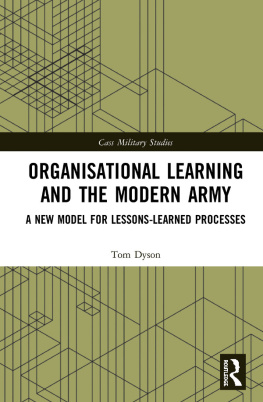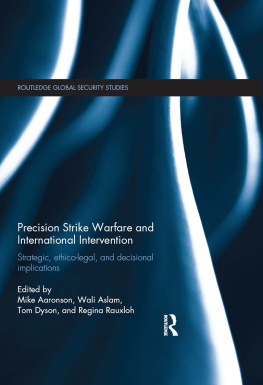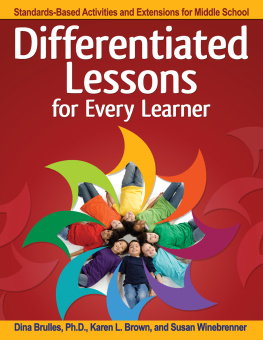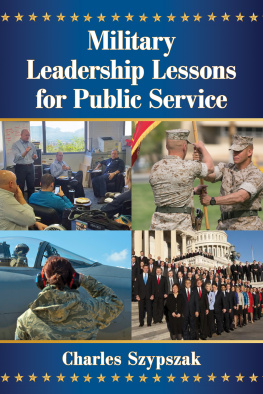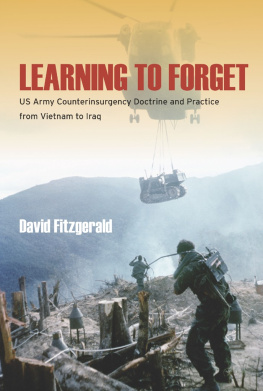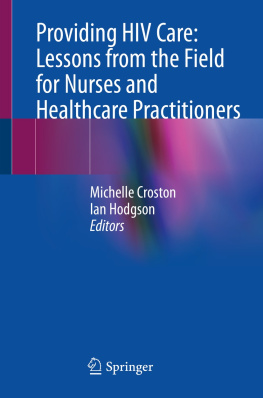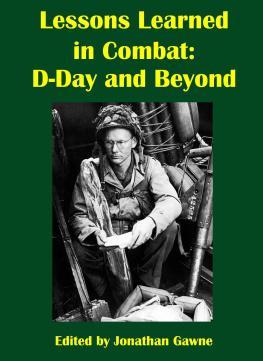Organisational Learning and the Modern Army
Drawing upon extensive original research, this book explores best practice in army lessons-learned processes.
Without the correct learning mechanisms, military adaptation can be blocked, or the wider lessons from adaptation can easily be lost, leading to the need to relearn lessons in the field, often at great human and financial cost. This book analyses the organisational processes and activities which can help improve tactical- and operational-level learning through case studies of lessons learned in two key NATO armies: that of Britain and of Germany. Providing the first comparative analysis of the variables which facilitate or impede the emergence of best practice in military learning, it makes an important contribution to the growing scholarship on knowledge management and learning in public organisations.
It will be of much interest to lessons-learned practitioners, and students of military and strategic studies, defence studies, organisation studies and security studies.
Tom Dyson is a Senior Lecturer in International Relations at Royal Holloway College. He is the author of The Politics of German Defence and Security, Neoclassical Realism and Defence Reform in post-Cold War Europe and the co-author (with Theodore Konstadinides) of European Defence Cooperation in EU Law and IR Theory .
CASS Military Studies
Israel, Strategic Culture and the Conflict with Hamas
Adaptation and Military Effectiveness
Niccol Petrelli
War and Strategy in the Modern World
From Blitzkrieg to Unconventional Terrorism
Azar Gat
Military Strategy of Small States
Responding to External Shocks of the 21st Century
Edstrm Hkan, Dennis Gyllensporre and Jacob Westberg
Western Military Interventions after the Cold War
Evaluating the Wars of the West
Edited by Marek Madej
Countering Insurgencies and Violent Extremism in Asia
Edited by Shanthie Mariet DSouza
Commercial Insurgencies in the Networked Era
The Revolutionary Armed Forces of Colombia
Oscar Palma
The Politics of Military Families
State, Work Organizations, and the Rise of the Negotiation Household
Edited by Ren Moelker, Manon Andres, and Nina Rones
Organisational Learning and the Modern Army
A New Model for Lessons-Learned Processes
Tom Dyson
For more information about this series, please visit: https://www.routledge.com/Cass-Military-Studies/book-series/CMS
Organisational Learning
and the Modern Army
A New Model for Lessons-Learned
Processes
Tom Dyson
First published 2020
by Routledge
2 Park Square, Milton Park, Abingdon, Oxon OX14 4RN
and by Routledge
52 Vanderbilt Avenue, New York, NY 10017
Routledge is an imprint of the Taylor & Francis Group, an informa business
2020 Tom Dyson
The right of Tom Dyson to be identified as author of this work has been asserted by him in accordance with sections 77 and 78 of the Copyright, Designs and Patents Act 1988.
All rights reserved. No part of this book may be reprinted or reproduced or utilised in any form or by any electronic, mechanical, or other means, now known or hereafter invented, including photocopying and recording, or in any information storage or retrieval system, without permission in writing from the publishers.
Trademark notice : Product or corporate names may be trademarks or registered trademarks, and are used only for identification and explanation without intent to infringe.
British Library Cataloguing-in-Publication Data
A catalogue record for this book is available from the British Library
Library of Congress Cataloging-in-Publication Data
Names: Dyson, Tom, author.
Title: Organisational learning and the modern army : a new model for lessons-learned processes / Tom Dyson. Other titles: Organizational learning and the modern army
Description: Abingdon, Oxon ; New York, NY : Routledge, 2019. | Series: Cass military studies | Includes bibliographical references. |
Identifiers: LCCN 2019011045 (print) | LCCN 2019016795 (ebook) | ISBN 9780429284014 (eBook) | ISBN 9780367247126 (hardback) | ISBN 9780429284014 (ebk)
Subjects: LCSH: Military educationCase studies. | Organizational learningCase studies. | Great Britain. ArmyPersonnel managementCase studies. | Germany. HeerPersonnel managementCase studies.
Classification: LCC U405 (ebook) | LCC U405 .D97 2019 (print) | DDC 355.6/88dc23
LC record available at https://lccn.loc.gov/2019011045
ISBN: 978-0-367-24712-6 (hbk)
ISBN: 978-0-429-28401-4 (ebk)
Typeset in Times New Roman
by Swales & Willis Ltd, Exeter, Devon, UK
For my daughter Nevena.
With love and gratitude.
While working on this book I have incurred a number of debts of gratitude. The book would not have been possible without the support of the Gerda Henkel Foundation. It generously provided the funding to undertake the empirical research and write the book (grant AZ 05/KF/15). I owe a special thanks to Thomas Podranski, the project manager of the Security, Society and the State programme, for his helpfulness and efficiency in administering the grant.
I am particularly grateful to my 67 interviewees within the British and German militaries for their time and their willingness to talk openly about the successes and failures of learning processes. I owe a deep debt of gratitude to Major Francis Brackley of the British Army Lessons Team, who worked very hard to arrange my interviews within the British Army, PJHQ, JFC, MoD and with retired personnel. I am also grateful to Mr Charles Heath-Saunders of Army Media and Communications for the time and effort he took to help secure the support of the Army Leadership and MoD for the project. Furthermore, I am very grateful for the efforts of Lieutenant-Colonel Klaus Gosenheimer and Lieutenant-Colonel Johannes Schall of the German Army LL Branch, who played a crucial role in facilitating interviews within the Bundeswehr .
The comments from discussants at several conferences including Dr Tobias Bunde, Professor David Dunn, Dr Niklas Helwig and Dr Oliver Schmitt were of great help in sharpening my arguments. I would also like to thank the Gerda Henkel Foundation and Professor Wolfgang Seibel and his colleagues at the University of Konstanz for hosting the Gerda Henkel Foundation Workshop in June 2017. It provided a very valuable opportunity to gain feedback on my research and to learn more about the projects of other scholarship holders. Furthermore, I would like to thank Professor Klaus Goetz, Professor Adrian Hyde-Price and Professor Anand Menon for their support and feedback on early drafts of my proposal.
I am especially grateful to Bastien Irondelle for his support of my work and for taking the time to comment on an early version of my project proposal. Bastiens untimely passing in 2013 was a great loss to the scholarly community on European security and military change. His many intellectual and personal qualities are deeply missed by his colleagues.
I am also very thankful for the opportunity to spend 201618 as a visiting researcher at the Bundeswehr Centre for Military History and the Social Sciences. Discussions with colleagues at the Centre, particularly Dr Ina Kraft, were of great help in overcoming intellectual hurdles along the way. I am especially grateful to Dr Heiko Biehl for helping me to attain security clearance within the German Defence Ministry and for his efforts to help me secure access to interview partners.

